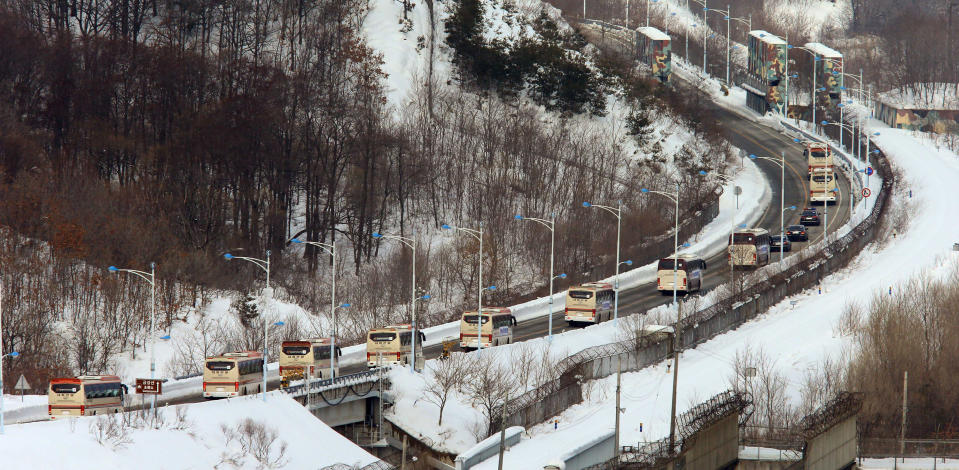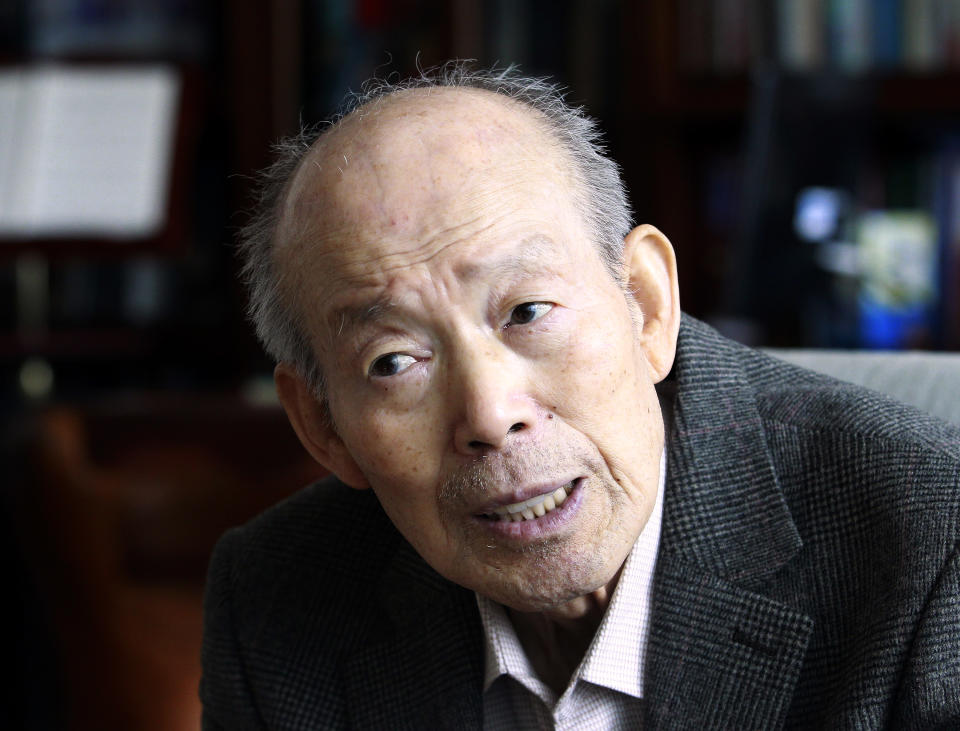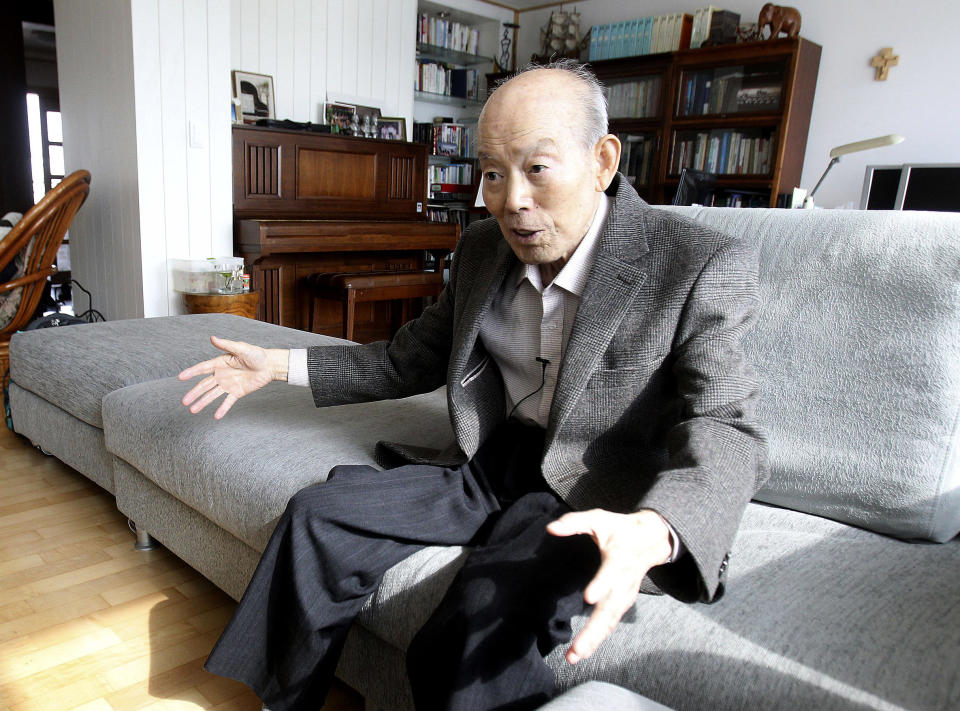Before Korean family reunions, fears of false hope
BUCHEON, South Korea (AP) — Kim Se-rin is sure he'll recognize his sister when they reunite — if they reunite — in North Korea on Thursday, more than 63 years after war drove them apart. And he knows what he'll say.
"I will first hug her and tell her that I thank her for having lived so long," the 84-year-old retired Seoul city official said. "Then, I will ask her when our father and mom passed away and when our sister and brother died."
What Kim doesn't know is what he'll do if their reunion — one of hundreds planned Thursday through Tuesday between North and South Koreans — falls victim to the ever-volatile relations between the two countries. Kim, who has chronic heart problems, got sick after North Korea abruptly scrapped the reunions in September, and he hasn't slept well since.
"I think this will be my last chance," Kim said during an interview at his home in Bucheon, just west of Seoul, last week. "How much longer can I live?"
Kim and about 500 other South Koreans left on buses Thursday morning for the North's scenic Diamond Mountain resort to take part in meetings that will reunite relatives for the first time since the bloody Korean War ended with an armistice in 1953. More than 260 North Koreans are expected to take part. No reunions have been held since late 2010, and if these meetings take place, it will be a positive sign for inter-Korean relations and a tearful relief to families separated by the world's most heavily fortified border.
The rival nations struck a deal last week to go ahead with brief meetings of war-divided families, though there's wariness in Seoul that Pyongyang could back out again. As they waited anxiously in the days leading up to the trip, many elderly Koreans had been unsure whether they would be able to see their long-lost relatives' faces before they die.
"I was really shocked last time when North Korea canceled the reunions. My health condition has worsened because of the stress from the cancellation," 85-year-old Lee Geun-su said Monday. He had planned to go to North Korea to see his younger sister, but on Wednesday, South Korea's Unification Ministry announced that he was too ill to go.
North Korea is pushing for better ties with South Korea, and has ratcheted down harsh rhetoric that swelled last spring with a torrent of threats to launch nuclear strikes against Seoul and Washington. Analysts say the North hopes better relations with Seoul will attract badly needed foreign investment and aid.
There is still a risk the reunions could be scrapped. The North earlier threatened to cancel the reunions due to upcoming annual military exercises between Seoul and Washington, which North Korea calls a rehearsal for invasion. Pyongyang also has previously cited critical South Korean news reports as a reason to distrust Seoul.
Millions of Korean families have been separated since the war. Both governments ban their citizens from visiting each other or even exchanging letters, phone calls and emails. During a previous period of inter-Korean rapprochement, about 22,000 Koreans have had brief reunions — 18,000 in person and the others by video.
In 2000, South Korea created a computerized lottery system for South Koreans hoping for reunions, and since then nearly 130,000 people, most in their 70s or older, have entered. Only about 70,000 are still alive.
Those selected for the aborted reunions in September get another chance this week. However, two of the South Koreans selected and three of North Koreans have died since then, according to South Korea's Red Cross, which is helping arrange the meetings along with its North Korean counterpart.
Time has already robbed Kim of the chance to reunite with his parents and two of the siblings he left behind on Dec. 4, 1950, six months after the Korean War broke out. Red Cross officials told him that only his 79-year-old sister Kim Yong Suk is still alive, though he also is expected to meet a son of his brother.
Now a frail, gray-haired octogenarian, Kim had taught Korean at a middle school in Hwangju, about 40 kilometers (25 miles) south of Pyongyang, and his sister was among his students. She was smart and pretty with thick, bobbed hair, and Kim remembers a fellow teacher who jokingly asked to marry her after graduation.
"She resembles me. We will recognize each other when we reunite," he said, smiling.
Kim said he fled his homeland with two friends because they worked for an anti-communist organization and were afraid of being caught by the North Korean authorities. He said he left in such a rush that he couldn't even tell his family members about his departure, and he had no idea how permanent his decision would be.
"I thought I could have dropped by my home ... I didn't know (the separation) would last this long," Kim said.
Kim joined the South Korean army after fleeing to the South, and said he thought seriously about death during fierce battles with Chinese soldiers. China intervened in the war to help North Korea, while the American-led U.N. forces fought alongside South Korea.
He said young Chinese soldiers got drunk on kaoliang, a fiery, throat-burning liquor, then climbed a hill in human-wave attacks, aiming their recoilless rifles squarely at the office of the South Koreans' battalion commander. "So many people died," he said.
He said huge numbers of Chinese soldiers were wiped out by bombs dropped by American B-29 bombers. "A reservoir turned into a pool of blood because it rained and mixed with blood from the corpses," he said.
Kim thought then that it would be his destiny to die in the South, away from his hometown. That has not changed: "I've told my grandchildren to move and bury my remains next to my parents' at our family gravesite after the unification."
He said that if he meets his sister, he will at least be able to pass on a message to his parents in the meantime.
"I'll ask her to go to the graveyard for our parents to say that she met me and that I've been living well in South Korea, because I cannot go there, and this reunion will be our last meeting," Kim said. "I will feel very relieved then."
___
Associated Press writer Kwon Su Hyeon contributed to this report from Seoul, South Korea.





